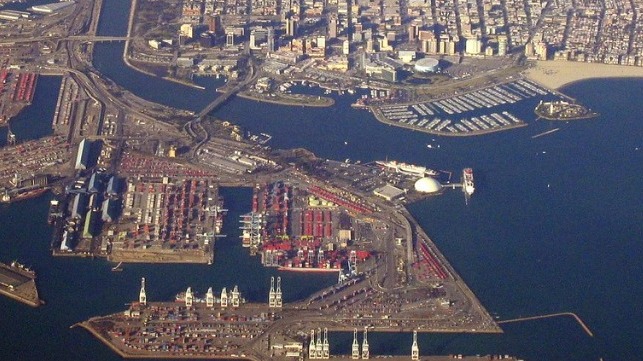To Ease Storage Crisis, Long Beach Lifts Limits on Container Stacking

The City of Long Beach, California is temporarily relaxing zoning rules to help address a desperate shortage of storage space for shipping containers. The trucking and rail companies that serve the twin ports of Los Angeles and Long Beach are struggling to keep up with skyrocketing cargo volume, driven by the relentless demands of American consumers.
80 percent of the products consumed in the U.S. are imported, and with spending on in-person services curtailed by the pandemic, Americans can budget more for goods than ever before. This means that more inbound cargo and outbound empties are attempting to pass through the LA/Long Beach truck gates than ever - roughly 10 percent more than in September 2019, before the COVID-19 pandemic hit the global supply chain.
Following pressure from President Joe Biden, LA / Long Beach terminal operators have agreed to transition to 24/7 gate hours. However, that change is not expected to resolve everything on its own. Containers and empties still need to be stored while awaiting pickup, and the ports' yards are nearly full. Boxes on chassis are tailing back into neighborhood streets, creating conflict with the ports' community, and dozens of ships are forced to wait at anchor or drift until the port has enough pierside space for their cargo.
In an effort to help relieve the pressure, the City of Long Beach has decided to relax enforcement of a longstanding ban on high-stacked containers on private property. For years, it has forbidden stacks of more than two boxes high, an aesthetic measure intended to preserve visual sightlines in the neighborhood. That rule will not be enforced for at least the next three months, and city lots that are zoned for container storage may now stack up to four boxes high (or even five, if they get approval from the fire department).
"Given this current national emergency and the Governor’s Executive Order to take necessary steps to alleviate the impacts on the system, the City Manager will temporarily waive enforcement of current shipping container stacking and height limits," the city said in a statement. "The City will work during the next 90-day period to assess the situation and the effectiveness of this solution and any impacts on the surrounding areas."
In the adjacent L.A. neighborhood of Wilmington, police have issued more than 400 citations for improperly-stored containers this month, L.A. Port Police Chief Tom Gazsi said at a harbor commission meeting last week. Local residents have reported an endless parade of drayage traffic, with trucks rumbling through (restricted) side streets, blocking driveways and stacking up on thoroughfares. "We know we have much work to do," said Chief Gazsi.
American demand supports China's growth
While the supply chain challenges are creating headaches for ports, consumers and U.S. officials, the spike in American demand has been a windfall for the Chinese economy. China is the largest single exporter of goods to the U.S. market, and in recent months, the value of its U.S.-bound exports has soared by about 20 percent year-on-year - totaling $43 billion in August alone.
The boom in the value of Chinese imports comes not just from sheer quantity, but from rising unit prices as well. According to Bloomberg, Chinese manufacturers believe that they have enough demand now to raise their prices and improve their profit margins.

that matters most
Get the latest maritime news delivered to your inbox daily.
“Whichever sellers our customers go to, the reality they’ll have to face is the same: price increases,” one confident umbrella exporter told Bloomberg, explaining why she had hiked the price of her goods by 20 percent.
The thriving export market is a welcome bright spot for China's economy, which has lost several percentage points off its typical GDP growth rate in recent months. The slowdown is caused by a range of domestic issues, including a real estate slump, sporadic COVID restrictions and a severe power shortage.
